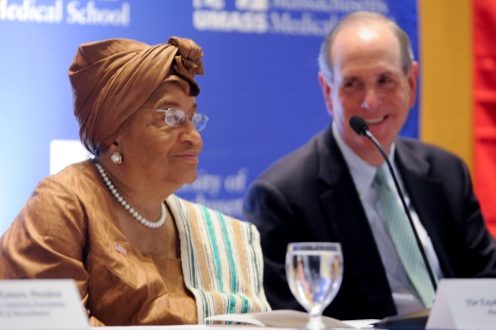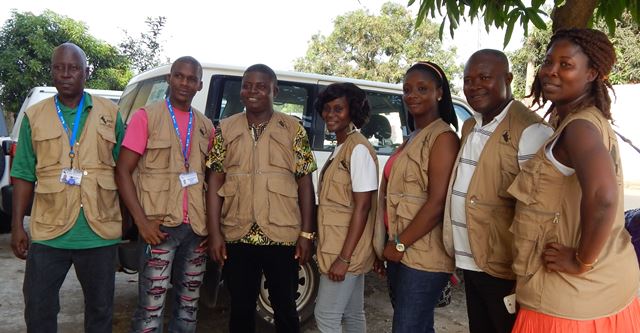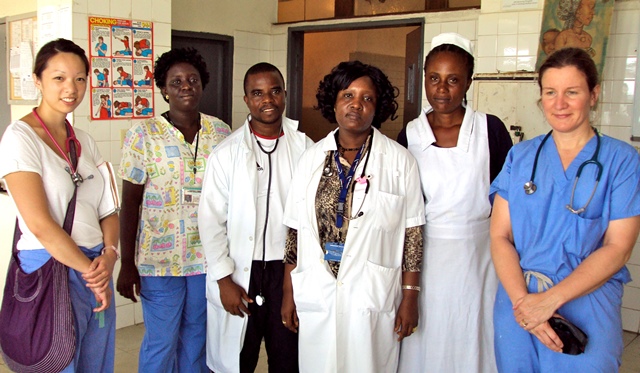$7.5M Paul G. Allen Family Foundation grant accelerated UMMS Ebola Relief effort
Academic medical centers partnered to provide health care, training and infrastructure in Liberia during 2014 Ebola crisis
With a $7.5 million grant awarded from the Paul G. Allen Family Foundation in October 2014, UMass Medical School led a team of academic partners in providing comprehensive relief efforts in Liberia, bringing doctors, nurses, and training and medical supplies to the then Ebola-stricken country.
 “We at the University of Massachusetts Medical School were grateful for the support of the Paul G. Allen Family Foundation, which allowed us to specifically work with our strategic partners on this grant and our Liberian colleagues to help stem the Ebola epidemic and strengthen Liberia’s fragile health care system,” said Chancellor Michael F. Collins. “Our academic collaborative had worked productively in the past with the Liberian leadership and health care workforce, and we were eager to continue that partnership by engaging directly with our Liberian collaborators and providing on-the-ground relief, training and supplies.”
“We at the University of Massachusetts Medical School were grateful for the support of the Paul G. Allen Family Foundation, which allowed us to specifically work with our strategic partners on this grant and our Liberian colleagues to help stem the Ebola epidemic and strengthen Liberia’s fragile health care system,” said Chancellor Michael F. Collins. “Our academic collaborative had worked productively in the past with the Liberian leadership and health care workforce, and we were eager to continue that partnership by engaging directly with our Liberian collaborators and providing on-the-ground relief, training and supplies.”
Shortly after the UMMS Ebola Relief effort was launched, UMMS and its collaborators on the grant partnered to reopen 16 hospitals that were overwhelmed by Ebola outbreaks.
“Everyone had heard about the deaths from Ebola, but many people didn’t realize how many women who needed C-sections were still dying. Children with malaria had nowhere to go,” said Patricia McQuilkin, MD, clinical associate professor of pediatrics at UMMS and a project leader on the Ebola relief grant. “Most hospitals were still closed and health care workers had no personal protective equipment and were too afraid to come back.”
 The UMMS-led team hired and trained teams of Liberian health care workers to become experts in safely managing Ebola cases. Teams of master trainers, which each included a Liberian doctor, nurse, midwife, psychologist and sanitation expert, were dispatched to spend one week at each hospital to train staff on U.S. Centers for Disease Control and Prevention standards for Ebola safety, triage, patient care, sanitation and getting in and out of personal protective equipment (PPE). The goal was to train everyone in the hospital, including janitors and cafeteria staff. One employee at each site was trained extensively on infection control and would monitor compliance closely. Bolstering the training effort, a critically needed shipment of $1.7 million in personal protective equipment for health care workers was flown to Monrovia, Liberia, in January 2015.
The UMMS-led team hired and trained teams of Liberian health care workers to become experts in safely managing Ebola cases. Teams of master trainers, which each included a Liberian doctor, nurse, midwife, psychologist and sanitation expert, were dispatched to spend one week at each hospital to train staff on U.S. Centers for Disease Control and Prevention standards for Ebola safety, triage, patient care, sanitation and getting in and out of personal protective equipment (PPE). The goal was to train everyone in the hospital, including janitors and cafeteria staff. One employee at each site was trained extensively on infection control and would monitor compliance closely. Bolstering the training effort, a critically needed shipment of $1.7 million in personal protective equipment for health care workers was flown to Monrovia, Liberia, in January 2015.
“The PPE was critical because, despite the fact that the Ebola epidemic had been going on for several months, many rural hospitals still did not have it,” said Dr. McQuilkin. “Also, it was critical that when the training teams were deployed to the hospitals that they had PPE to train with, to teach staff to ‘don and doff.’”
Built on a years-long relationship between UMMS and Liberia, the UMass Medical School Ebola Relief efforts funded by this grant were a new component of philanthropist Paul G. Allen’s increased commitment of at least $100 million in 2014 to the Tackle Ebola campaign he launched.

“This collaboration capitalized on the strong partnerships and relationships that UMMS and its academic partners have developed in Liberia to provide a multifaceted, cohesive response to the Ebola virus outbreak, and to provide critically needed routine health care to the people of Liberia,” said Katherine Luzuriaga, MD, professor of molecular medicine, pediatrics and medicine, director of the UMass Center for Clinical and Translational Science, and vice provost for clinical and translational research.
Dr. Luzuriaga had led past UMMS efforts in Liberia, and worked with faculty to submit the grant proposal on behalf of the Academic Consortium Combating Ebola in Liberia (ACCEL). The ACCEL consortium members include UMass Medical School, Boston Children’s Hospital, Mt. Sinai School of Medicine, University of Maryland, University of Florida, Addis Ababa University in
Ethiopia and Vanderbilt University, and Massachusetts Institute of Technology.
The Ebola epidemic in West Africa was the largest in history, with nearly 17,600 suspected cases reported and 6,500 deaths since December 2013.
For more information about the UMMS Ebola Relief effort, visit www.umassmed.edu/ebola.
Photos
Above right: Ellen Johnson Sirleaf, president of Liberia and a 2011 Nobel Peace Prize winner, with Chancellor Michael Collins at a community event organized by members of the local Liberian community on the occasion of her visit to Worcester in June 2012. President Johnson Sirleaf delivered the keynote address at the Medical School’s 39th Commencement exercises that year.
Middle right: Training team in Liberia in 2015.
Bottom right: From right, Patricia McQuilkin, MD, with local pediatric medical staff and Tammy Chang (then a pediatric resident) in Liberia in 2011.


